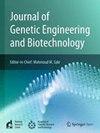杯状病毒科病毒基因组的微卫星多样性和复杂性。
IF 3.5
Q3 Biochemistry, Genetics and Molecular Biology
Journal of Genetic Engineering and Biotechnology
Pub Date : 2023-12-01
DOI:10.1186/s43141-023-00582-x
引用次数: 0
摘要
背景:微卫星或简单序列重复(SSR)由DNA或RNA的1-6个核苷酸基序组成,它们普遍存在于原核生物和真核生物的基因组中串联重复序列中。它们可能定位于编码区和非编码区。SSRs在复制、基因调控、转录和蛋白质功能中发挥重要作用。杯状病毒科(CLV)病毒具有ss-RNA,无包膜,二十面体对称,直径27-35 nm。基因组的大小介于6.4到8.6 kb之间。结果:系统分析了62种冠状病毒科代表的微卫星的发生率、组成、多样性、复杂性和寄主范围。NCBI (https://www.ncbi.nlm.nih.gov)评估全基因组序列,MISA软件提取微卫星。平均基因组大小在6273 (CLV61) ~ 8798 (CLV47) bp之间,约7538 bp。这些基因组的平均GC含量为~ 51%。在研究的基因组中,共有1317个SSRs和53个cSSRs。clv41和clv49的ssr发生率最高和最低,分别为32和10,而CLV16的ssr发生率最高为4。29个品种不含任何cSSR。单核苷酸、二核苷酸和三核苷酸SSRs的发生率分别为219、884和206。最常见的单核苷酸、二核苷酸和三核苷酸重复基序分别是“C”(126个SSRs)、AC/CA(240个SSRs)和TGA/ACT(23个SSRs)。大多数SSRs和cSSRs偏向于编码区,至少有90%的SSRs发生在基因组的编码区。具有相似宿主的病毒在系统发育树上彼此接近,表明病毒宿主是其进化的驱动力之一。结论:杯状病毒科基因组在发病率、组成和定位上不符合任何SSR标记模式。SSR的这一独特性质在病毒进化中起着重要作用。相似寄主在系统发育树上的聚类是SSR标记独特性的证据。本文章由计算机程序翻译,如有差异,请以英文原文为准。
Microsatellite diversity and complexity in the viral genomes of the family Caliciviridae
Background
Microsatellites or simple sequence repeats (SSR) consist of 1–6 nucleotide motifs of DNA or RNA which are ubiquitously present in tandem repeated sequences across genome in viruses: prokaryotes and eukaryotes. They may be localized to both the coding and non-coding regions. SSRs play an important role in replication, gene regulation, transcription, and protein function. The Caliciviridae (CLV) family of viruses have ss-RNA, non-enveloped, icosahedral symmetry 27–35 nm in diameter in size. The size of the genome lies between 6.4 and 8.6 kb.
Results
The incidence, composition, diversity, complexity, and host range of different microsatellites in 62 representatives of the family of Caliciviridae were systematically analyzed. The full-length genome sequences were assessed from NCBI (https://www.ncbi.nlm.nih.gov), and microsatellites were extracted through MISA software. The average genome size is about 7538 bp ranging from 6273 (CLV61) to 8798 (CLV47) bp. The average GC content of the genomes was ~ 51%. There are a total of 1317 SSRs and 53 cSSRs in the studied genomes. CLV 41 and CLV 49 contain the highest and lowest value of SSRs with 32 and 10 respectively, while CLV16 had maximum cSSR incidence of 4. There were 29 species which do not contain any cSSR. The incidence of mono-, di-, and tri-nucleotide SSRs was 219, 884, and 206, respectively. The most prevalent mono-, di-, and tri-nucleotide repeat motifs were “C” (126 SSRs), AC/CA (240 SSRs), and TGA/ACT (23 SSRs), respectively. Most of the SSRs and cSSRs are biased toward the coding region with a minimum of ~ 90% incident SSRs in the genomes’ coding region. Viruses with similar host are found close to each other on the phylogenetic tree suggesting virus host being one of the driving forces for their evolution.
Conclusions
The Caliciviridae genomes does not conform to any pattern of SSR signature in terms of incidence, composition, and localization. This unique property of SSR plays an important role in viral evolution. Clustering of similar host in the phylogenetic tree is the evidence of the uniqueness of SSR signature.
求助全文
通过发布文献求助,成功后即可免费获取论文全文。
去求助
来源期刊

Journal of Genetic Engineering and Biotechnology
Biochemistry, Genetics and Molecular Biology-Biotechnology
CiteScore
5.70
自引率
5.70%
发文量
159
审稿时长
16 weeks
期刊介绍:
Journal of genetic engineering and biotechnology is devoted to rapid publication of full-length research papers that leads to significant contribution in advancing knowledge in genetic engineering and biotechnology and provide novel perspectives in this research area. JGEB includes all major themes related to genetic engineering and recombinant DNA. The area of interest of JGEB includes but not restricted to: •Plant genetics •Animal genetics •Bacterial enzymes •Agricultural Biotechnology, •Biochemistry, •Biophysics, •Bioinformatics, •Environmental Biotechnology, •Industrial Biotechnology, •Microbial biotechnology, •Medical Biotechnology, •Bioenergy, Biosafety, •Biosecurity, •Bioethics, •GMOS, •Genomic, •Proteomic JGEB accepts
 求助内容:
求助内容: 应助结果提醒方式:
应助结果提醒方式:


